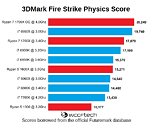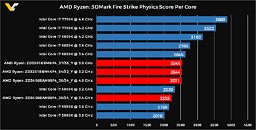Friday, February 17th 2017

AMD Ryzen 1700X, 1600X & 1300 Benchmarks Leaked
A number of sites have been reporting on some leaked (as in, captured from Futuremark's database) scores on AMD's upcoming CPUs. Now, some benchmarks seem to have surfaced regarding not only the company's 8-core, 16-thread monsters, but also towards its sweet-spot 6-core, 12-thread CPUs and its more mundane 4-core offerings.
Taking into account some metrics (which you should, naturally, take with some grains of salt), and comparing Intel's and AMD's Ryzen offerings on 3DMark's Fire Strike Physics scores, we can see that a $389 Ryzen 7 1700X (8 cores, 16 threads) at its base clock of 3.4 GHz manages to surpass Intel's competing (in thread count alone, since it retails for $1089) 6900K running at its base 3.2 GHz frequency - with the Ryzen processor scoring 17,878 points versus the 6900K's 17,100. Doing some fast and hard maths, this would mean that if the R7 1700X was to be clocked at the same speed as the 6900K, it would still be faster, clock for clock (though not by much, admittedly). We don't know whether Turbo was disabled or not on these tests, for either AMD's or Intel's processor, so we have to consider that. However, if Turbo were enabled, that would mean that the R7 1700X's clockspeed would only be 100 MHz higher than the 6900K's (3.8 GHz max, vs 3.7 GHz max on the Intel CPU).We see the same when comparing AMD's six-core, $259 R5 1600X against Intel's $617 6850K, with the Ryzen sample posting virtually the same score, despite running at a 300 MHz lower base clock (3.3 Ghz against Intel's 3.6 Ghz).Jumping to a per-core analysis of processor speed in the same test suite, though, also reveals some very interesting metrics. here is a test which clearly doesn't scale all that well with extra cores, actually becoming more inefficient, per core, as the number of those increases. However, we can clearly see how much of an improvement AMD has achieved in per-core performance, with the R7 1700X scoring within spiting distance of its much more expensive i7 6900K competition.
Can we just get some real reviews of these pieces of silicon already?
Sources:
Videocardz, WCCFTech
Taking into account some metrics (which you should, naturally, take with some grains of salt), and comparing Intel's and AMD's Ryzen offerings on 3DMark's Fire Strike Physics scores, we can see that a $389 Ryzen 7 1700X (8 cores, 16 threads) at its base clock of 3.4 GHz manages to surpass Intel's competing (in thread count alone, since it retails for $1089) 6900K running at its base 3.2 GHz frequency - with the Ryzen processor scoring 17,878 points versus the 6900K's 17,100. Doing some fast and hard maths, this would mean that if the R7 1700X was to be clocked at the same speed as the 6900K, it would still be faster, clock for clock (though not by much, admittedly). We don't know whether Turbo was disabled or not on these tests, for either AMD's or Intel's processor, so we have to consider that. However, if Turbo were enabled, that would mean that the R7 1700X's clockspeed would only be 100 MHz higher than the 6900K's (3.8 GHz max, vs 3.7 GHz max on the Intel CPU).We see the same when comparing AMD's six-core, $259 R5 1600X against Intel's $617 6850K, with the Ryzen sample posting virtually the same score, despite running at a 300 MHz lower base clock (3.3 Ghz against Intel's 3.6 Ghz).Jumping to a per-core analysis of processor speed in the same test suite, though, also reveals some very interesting metrics. here is a test which clearly doesn't scale all that well with extra cores, actually becoming more inefficient, per core, as the number of those increases. However, we can clearly see how much of an improvement AMD has achieved in per-core performance, with the R7 1700X scoring within spiting distance of its much more expensive i7 6900K competition.
Can we just get some real reviews of these pieces of silicon already?


99 Comments on AMD Ryzen 1700X, 1600X & 1300 Benchmarks Leaked
The implication is that Intel will just sit there and let AMD beat them on performance/price and lose half their market share in a hurry? That would be stupid, and there is no reason why they need to do that. If they don't have something new and better waiting in the wings, then reorganizing the placement of their chips and the volumes produced is the best solution. Ramp up production of the better i5s and i7s and drop them down a tier in price, assuming that Ryzen makes this necessary.
What kind of fool upgrades just to wave their epeen at others saying their system is faster than another company's product? Especially if said product is dramatically cheaper.
You should only upgrade for needed performance or if you want a new system to tinker with or for a different form factor or some tangible benefit. Anything else is like diamonds on a mobile phone; bling/pose/wasteful nonsense (IMO of course).
And price/performance is a real factor too of course.
Historically it is AMD who has given these things to customers. How often have AMD changed socket/cooler support versus Intel? And it's not just changes (in Intel's case) needed to add new features, it's only been to force extra spend. Not very environmentally sound either.
AM4 looks to continue that trend.
I'm thinking you are just trolling TBH!
How I could affraid from AMD when my motherboard could hold more than 10 models stronger than premium AMDs Ryzen.
AMD should feel bad because after 5 years of reasearch after he finally launch chipset and CPU in 2017 I will be able to outperform him with Intel chipset from 2014 and processor from 2016.
How I could feel bad, and someone would say OK you can offer same performance but AMD have probably some newer and better features, but Noooo, we haver better features and WE are in advantage and he will choke with DDR4...
I only wait price optimization and many loyal Intel customers.
If owner of X99 platform install i7-6950X and OC he could extend life time of platform from 4 on 7 years easy and still to be competitive. Who knows when AMD will outperform i7-6950X. His high price was result of monopoly, that's not real price, tomorrow if situation allow he could cost 700$, what then? Than Intel could sell more i7-6950X than AMD Ryzens.
How X99 chipset can't beat premium AMD.
Did you saw how perform Intel 10 core i7-6950X after 1.0 GHz OC.
Who will outperform him? 8 core Ryzen?
Of course I take it personally, that's my writing you're talking about :p But that doesn't mean I take it the wrong way.
What you say is something I am keenly aware of that I need to improve. For me, the sentences read just fine, even aloud, but I sometimes look at the graphical blot of my posts and I see that there probably should be some more stops.
Thanks for the constructive criticism, and it's something I will try and increase awareness for in the future =)
Thumbs up.
Benchmarks include CPU-Z shots.
Well for starters, that compiler is not even used for any of the benchmarks in question.
Of course, every time AMD fails to deliver on performance it's the competitor's fault.
For what exactly?
For very long time now, max users might want is quad. And for not much shorter future, its all they will buy and want. Apart very specific applications, 6 or 8 core CPU is useless for regular users.
I know what I'll pick & most other users here would agree with that choice, it seems more logical to me & much more bang for buck besides the fact that it's much better in MT tasks.
Just out of curiosity, what you plan to run on that?
Gamers might not need them yet, but in the future this might change ...
I need more cores for encoding, archiving & audio file conversion. The file archiving part is essential since I want to move away from HDD completely & need a copy of important files for SSD. The cloud is not a viable option since the broadband plans are prohibitively expensive & ISP connection is unreliable at times.
And what CPUs do we have in major consoles? Weak 8 cores.
Consequences? A number of newer games can utilize more than 4 cores. (Overwatch, Battlfield 1, Tomb Raider to name a couple)
It should be a point to consider even for people frequently upgrading, even more so for those who normally upgrade once in 3-5 years.
for comparison, Intel 4 cores (note that they have higher base frequency):
However, it's a big part. We've seen what deplorable IPC can do with more cores (read bulldozer).
The reality of things is many have a 4c8t cpu already. Many of those can't use more than 8t. For those that can, this is a great part. For those that can't, I'm sure 3 years down the road, an 8t processor is going to do juuuuust fine. The real benefit, for those that don't encode/render use more than 8t, is the unreleased R5 parts.
Rmemeber, people have been saying, with what they thought were good reason, you should go quad since Q6600 days... that has only paned out recently, really... especially in a gaming context. How many threads here with a budget in mind recommend quads over quads with ht?? So really it depends on the user and how they use their machine.
I think people are going to be pretty sad when they figure out there is barely any overclocking headroom and when they see the base turbo is only 2c4t...XFR is single core 100mhz up. I have a feeling you will again need beefy board and beefy cooling to use all cores much above 4.2ghz...I think these will top out on ambient well under 4.5ghz.